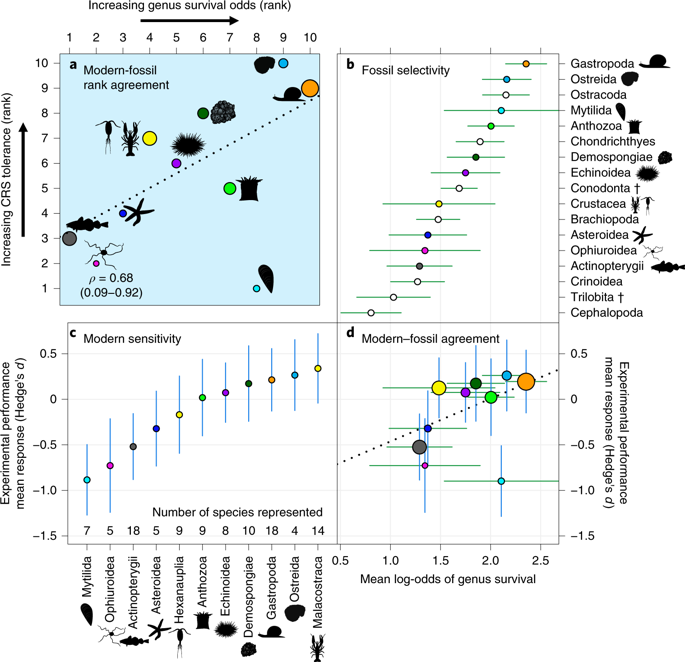Nature Climate Change ( IF 29.6 ) Pub Date : 2020-02-10 , DOI: 10.1038/s41558-020-0690-7 Carl J. Reddin , Paulina S. Nätscher , Ádám T. Kocsis , Hans-Otto Pörtner , Wolfgang Kiessling

|
Rapid climate change is postulated to cause marine extinctions, especially among climate-sensitive clades, traits and regions1,2,3,4,5,6. This premise is based on two hypotheses: (1) known individual physiological sensitivities scale up to macroecological selectivity patterns4,7,8 and (2) ancient hyperthermal events are appropriate models to anticipate ecological winners and losers of anthropogenic climate change9. Yet these hypotheses have largely escaped quantitative appraisal. Here we show that experimental responses of modern marine ectotherms to single and combined climate-related stressors (such as seawater warming, hypoxia and acidification) align with Phanerozoic fossil extinction regimes across clades and functional traits. Of climate-related stressors, the synergistic interaction between warming and hypoxia10, encumbering aerobic metabolism, has the greatest potency as a proximate driver of extinction. All else being equal8, this synergy particularly imperils modern warm-water organisms. Modern–fossil agreement is strongest at intermediate–high extinction intensities and hyperthermal events but may fail at extreme extinction events, perhaps due to rising prominences of, and interactions among, additional biotic and abiotic stressors. According to results from marine ectotherms, clade-based sensitivity of individuals to climate-related stressors scales up from subannual experiments and decadal range-shift response magnitudes11, to extinction selectivity patterns at ancient climate-related stressor events and the Phanerozoic durations of genera.
中文翻译:

海洋进化枝对气候变化的敏感性跨越时间尺度
假设迅速的气候变化会导致海洋灭绝,特别是在气候敏感的进化枝、特征和区域1,2,3,4,5,6中。这个前提基于两个假设:(1) 已知的个体生理敏感性扩大到宏观生态选择性模式4,7,8和 (2) 古代高温事件是预测人为气候变化的生态赢家和输家的合适模型9. 然而,这些假设在很大程度上逃脱了定量评估。在这里,我们表明现代海洋变温动物对单一和组合的气候相关压力源(如海水变暖、缺氧和酸化)的实验反应与跨进化枝和功能特征的显生宙化石灭绝机制一致。在与气候相关的压力源中,变暖和缺氧10之间的协同相互作用阻碍了有氧代谢,是导致灭绝的最直接驱动因素。其他都一样8,这种协同作用尤其危及现代温水生物。现代化石协议在中高灭绝强度和高温事件中最强,但在极端灭绝事件中可能失败,这可能是由于额外的生物和非生物压力源的日益突出以及它们之间的相互作用。根据海洋变温动物的结果,个体对气候相关压力源的基于进化枝的敏感性从亚年度实验和年代际范围变化响应幅度11扩大到古代气候相关压力源事件和显生宙属持续时间的灭绝选择性模式。









































 京公网安备 11010802027423号
京公网安备 11010802027423号